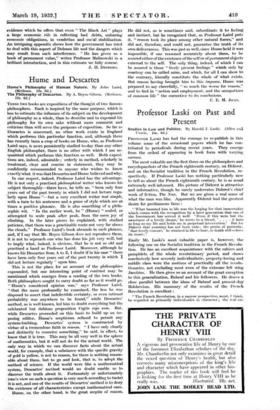Hume and Descartes
Hume's Philosophy of Human Nature. By John Laird. (Methuen. 12s. 6d.) TUESE two books are expositions of the thought of two fitntous philosophers- Each is impired by the same purpose, which is less to estimate the influence of its subject on the development of philosophy as ss whole, than to describe and to expound his philosophy for its own sake without more comment and criticism than will serve the purposes of exposition. So far us Descartes is concerned, no other work exists in England which performs this particular function, and, although there has recently been a crop of books on Hume, who, as Professor Laird says, is more persistently studied to-day than any other English philosopher, there is no other with which I am ac- quainted which performs this function so well. Both exposi- tions are, indeed, admirable ; orderly in method, scholarly in treatment, clear and concise in statement, they may be confidently reconunended to anyone who wishes to know exactly what it was that Descartes and flume believed and why.
In one respect, indeed, Professor Laird has the advantage. Ile is not only a practised philosophical writer who knows his subject thoroughly—there have, he tells us, " been only four years out of the past twenty in which I did not lecture regu- larly upon Hume "—but a very excellent writer tout simple, with a turn to his sentences and a grace of style which arc at times a positive pleasure. He is also something of a philo- sophic wit. " In the earlier work, he " (Hume) " scaled, or attempted to scale peak after peak, from the mere joy of climbing. In the later pieces he explained, with studied patience, that there was a practicable route not very far above the clouds." Professor Laird-s book abounds in such phrases, and, if I say that Mr. Boyce Gibson does not reproduce them, it is not to reproach one who has done his job very well, but to imply what, indeed, is obvious, that he is not so old and practised a hand as Professor Laird. Moreover, although he "knows his Descartes from A to Z, I doubt if in his case " there have been only four years out of the past twenty in which I did not lecture regularly " upon him.
This is not the place for an account of the philosophies expounded, but one interesting point of contrast may be :mentioned which emerges from a reading of the two books. Both philosophers sought to carry doubt as far as it would go. " Hume's considered opinion was," says Professor Laird, "-that the more profoundly he examined, the less he was disposed to assert that indefectible certainty, or even rational probability was anywhere to be found," while Descartes' method, as is well known, led him to doubt everything but the celebrated but dubious proposition Cogito ergo sum. But while Descartes proceeded on this basis to build up an im- posing edifice, Hume's scepticism refused to permit any system-building. Descartes' system is constructed by - virtue of a tremendous faith in reason. " I have only clearly and distinctly to conceive something," he said, in effect, to know that it is true. This may be all very well in the sphere of mathematics, but it will not do for the actual world. The only way in which we can discover facts about the actual 'world, for example, that a substance with the specific gravity of gold is yellow, is not to reason, for there is nothing reason- able about them, but to go and look, that is, to adopt the method of science. If the world were like a mathematical system, Descartes' method would no doubt enable us to discover the truth about it. Fortunately or unfortunately (one's view on such a question is very much according to taste) it is not, and one of the results of Descartes' method is to deny the existence of all characteristics except mathematical ones.
Hume, on the other hand, is the great sceptic of reason.
He did not, as is sometimes said, subordinate it to feeling and instinct, but he recognized that, as Professor Laird puts it, " reason took its place among other natural forces," and did not, therefore, and could not, guarantee the truth of its own deliverances. This was just as well, since Hume held it was impossible, if one reasoned accurately about them, to be assured either of the existence of the self or of permanent objects external to the self. The only thing, indeed, of which I can be assured is those " lively present feelings " which only by courtesy can be called mine, and which, for all I can show to the contrary, literally constitute the whole of what exists. But reason having brought hint to this impasse, Hume was prepared to say cheerfully, so much the worse for reason," and.to find in " action and employment, and the occupations of conunon life " the corrective to its conclusions.
C. F. M. Joao.






































 Previous page
Previous page